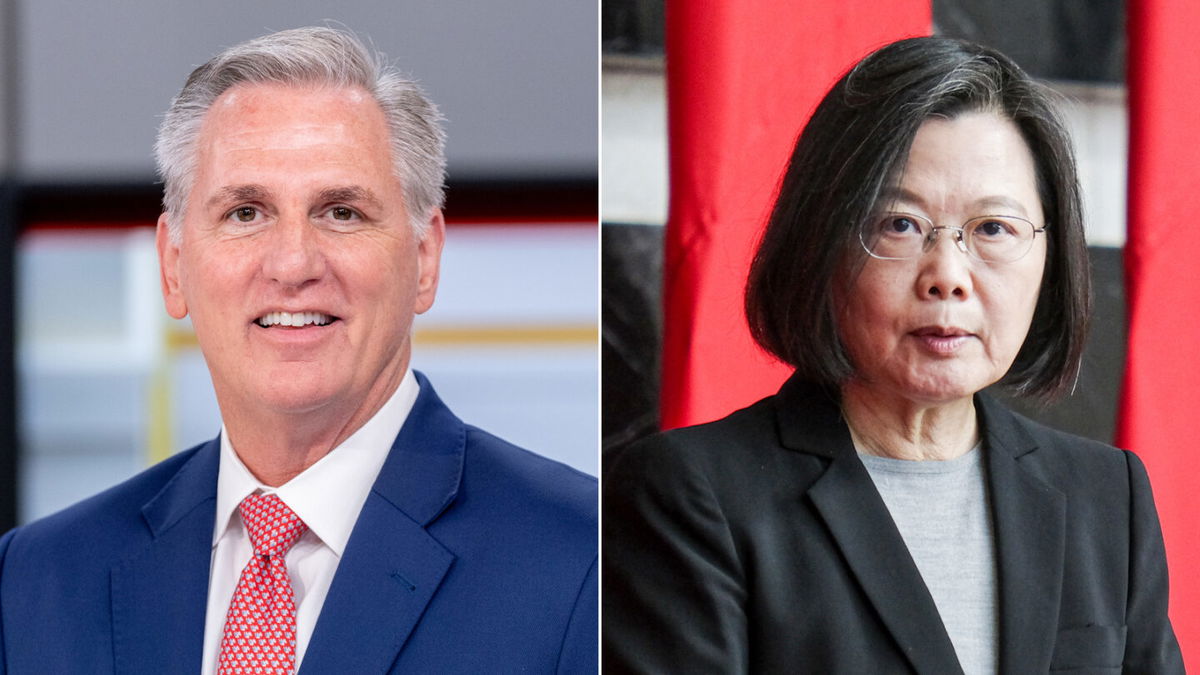Why the Taiwan meeting matters

Kevin McCarthy on Wednesday will become the second US House speaker to meet with Taiwan's president in person in the span of a year when he sits down with Tsai Ing-wen in southern California.
By Kevin Liptak and Lauren Fox, CNN
Kevin McCarthy on Wednesday will become the second US House speaker to meet with Taiwan’s president in person in the span of a year when he sits down with Tsai Ing-wen in southern California.
His meeting could be considered less provocative than Nancy Pelosi’s visit to the island in August, a trip the Biden administration quietly sought to dissuade her from taking given the potential for ratcheting up tensions in the region.
But it’s still drawn threats of retaliation from China and threatens to cause further deterioration in the deeply strained ties between Washington and Beijing.
Why are these meetings so important for congressional leaders?
Both Pelosi and McCarthy want to demonstrate American support for the self-governing island and neither wants to be seen backing down in the face of threats from China.
For McCarthy, the meeting is another example of a speaker who has pledged to make the US and China relationship a central focus of his speakership. Pelosi, who visited Tiananmen Square in 1991 to unfurl a pro-democracy banner, also has a long history of showing support for democracy movements.
A source close to McCarthy tells CNN that the meeting, which is happening in his home state at the Reagan Presidential Library just four months into his speakership, is an important moment for McCarthy, who made creating a select committee on China one of his top priorities and who views the US relationship with China as a central issue of our time.
The source told CNN that in the planning of this meeting it was also important for McCarthy to make sure this meeting was bipartisan. McCarthy will be joined on Wednesday by Democrats including Rep. Peter Aguilar, a member of their leadership.
This also comes as other members including Democratic Leader Hakeem Jeffries and three US senators met with Tsai last week in New York.
Why does China oppose these meetings?
Taiwan is a highly sensitive issue for Beijing and Chinese President Xi Jinping. The People’s Republic of China claims the island as its own territory, and has lambasted meetings between US and Taiwanese officials, saying it shows support for Taiwanese independence.
China’s Communist Party claims the self-governing democracy as its own despite never having controlled it, and has vowed to take the island, by force if necessary.
When Pelosi visited Taiwan last summer, Beijing launched extensive military drills around Taiwan and suspended several lines of communication with Washington — raising concerns about aggressive and destabilizing steps it may take in response to Tsai’s sit-down with McCarthy, even though this meeting is taking place in the US.
A major concern among US officials is that a miscalculation or miscommunication in the region could ignite a broader conflict as tensions escalate.
Where does the White House stand?
The White House is declining to say whether it supports the planned meeting between McCarthy and Taiwan’s president. When Pelosi was planning her visit to Taiwan last year, administration officials quietly sought to dissuade her from making the trip, but Biden did not outright ask her to cancel.
The US maintains an unofficial relationship with Taiwan and Tsai’s transit through the country is therefore not an official visit in order to keep Washington aligned with its longstanding “One China” policy.
Under the policy, the US acknowledges China’s position that Taiwan is part of China, but has never officially recognized Beijing’s claim to the island of 23 million. It is also bound by law to provide the democratic island with the means to defend itself.
Biden, however, has gone further in his public remarks. He has said four times as president he would use US military power to defend Taiwan if China were to invade.
Congress has remained a key pillar of that unofficial relationship — with delegations of lawmakers visiting the island and driving legislation enhancing support or coordination in recent years in the face of increasing military, economic and diplomatic pressure on the island from Beijing.
The-CNN-Wire
™ & © 2023 Cable News Network, Inc., a Warner Bros. Discovery Company. All rights reserved.